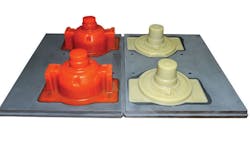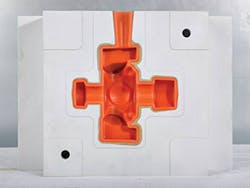First, the expanded possibilities of computer-aided design (CAD) programs reset the bar for metalcasters to execute more imaginative, detailed, and complex shapes. Now, 3D manufacturing is increasing the challenge for design detail — in particular to investment casters, diecasters, and permanent mold casters, and the design challenge is of course carried into the process. Some new advantages may be available to them from the developers of more standard casting supplies.
Rampf Tooling Solutions, a developer and producer of board and liquid materials and semi-finished products for modeling and mold engineering, has received a patent from the German Patent and Trademark Office for a face casting system, specifically for the casting resin and the manufacturing process using face casting.
The main advantage of the face-casting method is that, once mold or corebox surfaces become worn, the undersized base bodies can be recoated at little cost. There are two methods of producing pattern plates and coreboxes using this process:
To manufacture a pattern plate, the first step is to make an original model or prototype pattern plate. This is then used to create a negative. After that, an undersized backing is produced for face casting. This backing may be made of a wide range of materials such as wood, plastic or metal. “The key criterion used to select the material for the backing is the quality that needs to be achieved in terms of stability and dimensional stability,” according to Marcus Vohrer, head of application engineering at Rampf Tooling Solutions. The finished backing and the negative are assembled in the correct dimensions.
To manufacture a corebox, an initial core must be developed to serve as a model for the actual sand core. The backing of the corebox is made of wood, plastic, or metal, depending on the quality requirements, with allowance for the core. Then, the core is mounted to the backing using a mold parting line (core support). The face-casting layer is cast via the sprue point, which should be sited at the deepest part of the cavity. The face-casting layer acts as the effective surface, thus it is the area that is put under the most stress. Face casting can be carried out by hand or by using mixing and dispensing systems.
The Raku-Tool® PC-3458 / PH-3958 face casting system uses a highly abrasion-resistant material that the developer claimed has already been used to produce over 200,000 parts. It can be poured manually in quantities of up to 25 kilograms, and cures for use the following day. It reportedly is the only commercially available system with a heat-deflection temperature (HDT-B) of 95°C, which promotes higher process temperatures and thereby increases production capacity over the long term.
Thanks to the high number of parts the systems is able to produce, it is particularly well suited to large-volume series production of coreboxes and pattern plates. Advantages include the material’s “exceptional” dimensional stability; dimensional accuracy for the foundry equipment (metal backing); high chemical resistance; swelling prevention; and minimal (or no) sand adhesion. The system also reduces maintenance costs, as only the face-casting layer needs to be renewed once the wear limit is reached.
Rampf claims that over 80,000 parts have been produced using the Raku-Tool PC-3459 / PH-3958 face casting system. The beige-colored formula is ready for use after curing at room temperature for five to seven days. Raku-Tool PC-3459 / PH-3958 has an HDT-B of 65°C and can be poured manually in quantities of up to approx. 110 kg.
“Our patented face-casting system and the associated manufacturing process give our customers in the foundry industry that vital competitive edge,” according Jochen Reiff, sales/marketing director at Rampf Tooling Solutions. “The system offers unrivaled performance and quality thanks to the exceptional abrasion resistance and dimensional stability and ultimately saves our customers both time and money.”

